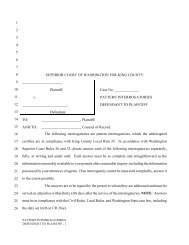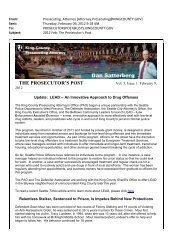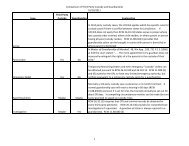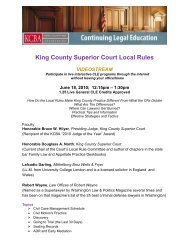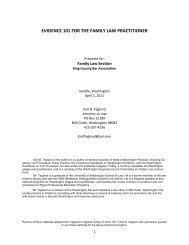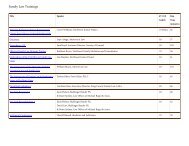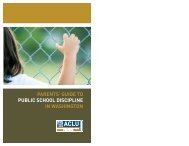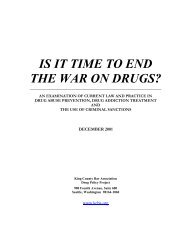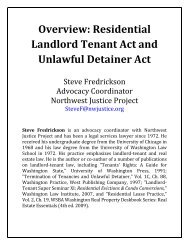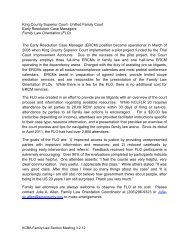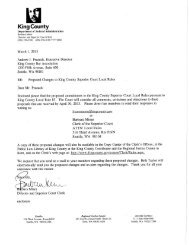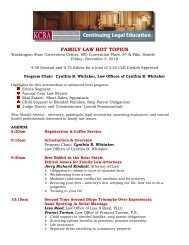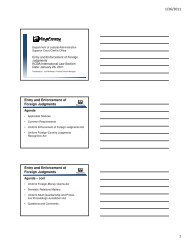Effective Drug Control: Toward A New Legal Framework
Effective Drug Control: Toward A New Legal Framework
Effective Drug Control: Toward A New Legal Framework
You also want an ePaper? Increase the reach of your titles
YUMPU automatically turns print PDFs into web optimized ePapers that Google loves.
III. CONTROLLING PSYCHOACTIVE SUBSTANCES:<br />
THE CURRENT SYSTEM AND ALTERNATIVE MODELS<br />
THE CURRENT SYSTEM OF DRUG CONTROL<br />
The current legal framework for drug control is composed of three legal tiers:<br />
international treaties; federal statutes and regulations; and state statutes and regulations.<br />
The laws at each level function as an interlocking system intended to limit certain<br />
medical uses of drugs, to prevent the diversion of certain drugs for “non-medical” uses<br />
and to enforce the absolute prohibition of the use and sale of certain other drugs.<br />
International Treaties<br />
The United States is a party to three international treaties that provide the basic<br />
legal framework for a worldwide system to control drugs that have been determined to<br />
have a high potential for abuse. 354 The purpose of the treaties is to limit the use of drugs<br />
to medical and scientific purposes only. 355<br />
Most nations are signatories to the U.N. Conventions, which prohibit the use and<br />
sale of the same drugs that are prohibited in the United States. 356 The U.N. conventions<br />
are part of the large body of international law that is not “enforceable” in the traditional<br />
sense, but signatories to the drug control treaties are subject to enormous diplomatic<br />
pressure, particularly from the United States, not to enact national laws that depart from<br />
the prohibition framework. The International Narcotics <strong>Control</strong> Board (INCB), an<br />
independent body within the United Nations, serves more as a panel to monitor adherence<br />
to the U.N. conventions rather than as an enforcement agency, but it often voices support<br />
for or objection to drug policy developments around the world, consistent with prevailing<br />
U.S. domestic and foreign drug policy interests. 357<br />
U.S. <strong>Drug</strong> <strong>Control</strong> – Federal Preemption<br />
The federal government regulates psychoactive substances under a series of<br />
statutory schemes, mainly under Title 21 of the United States Code. These include the<br />
<strong>Control</strong>led Substances Act, the Federal Food, <strong>Drug</strong> and Cosmetic Act and the enabling<br />
acts authorizing the Office of National <strong>Drug</strong> <strong>Control</strong> Policy and the <strong>Drug</strong> Enforcement<br />
Administration. Other miscellaneous federal initiatives found throughout the U.S. Code<br />
address drug use as it relates to other areas of law regulated by the federal government,<br />
including enhanced penalties for use of prohibited drugs in federal prison 358 and federal<br />
aid for state drug courts.<br />
<strong>Control</strong>led Substances Act<br />
The <strong>Control</strong>led Substances Act (CSA) 359 begins with congressional findings that<br />
many drugs being controlled have a legitimate medical purpose, but that the illegal<br />
importation, manufacture, distribution and possession and improper use have “a<br />
substantial and detrimental effect on the health and general welfare of the American<br />
people.” 360 The CSA authorizes the Attorney General to place controlled substances on a



